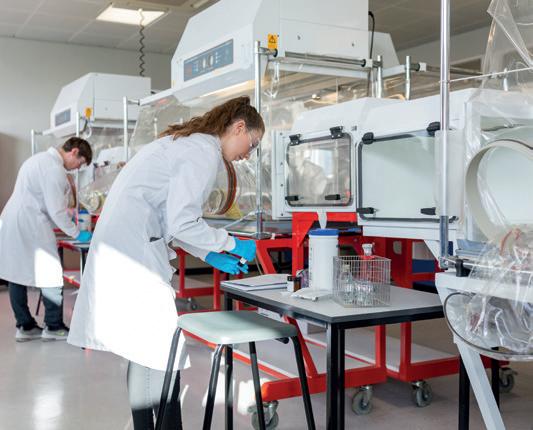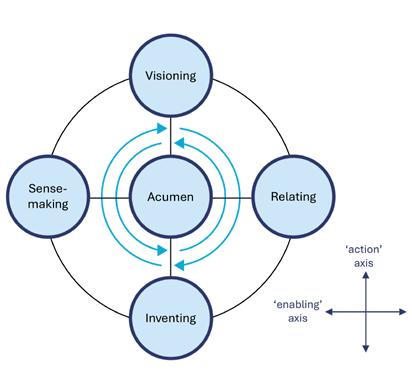
3 minute read
LIFT-OFF FOR NEXT PHASE OF LOCAL SKILLS IMPROVEMENT PLAN
Businesses must “get round the table or face being on the menu”, says industry leader
The Liverpool City Region’s Local Skills Improvement Plan (LSIP) is set to take a major step forward as it enters an important new phase.
A six-month period of detailed consultation is now underway with business leaders across the city region to understand their current and future skills requirements and gain their insights on how to help education and training providers resolve long-term challenges.
This information will be used to inform recommendations for the creation of a new plan, known as LSIP 2.0, aligned with and further supporting delivery of the LCR Local Growth Plan. It aims to improve career opportunities for young people over the next three years, with specific focus on sectors including construction, advanced manufacturing, professional and business services, hospitality and visitor economy.
A review of recent LSIP activity, including its sector-led industry learning partnerships, was shared at a conference entitled Impact & Ambition, organised by Liverpool Chamber, which is the chief convenor of the LCR LSIP alongside other local Chambers of Commerce. More than 100 delegates heard from business and college leaders on the various collaboration projects and examples of best practice they have achieved.
Paul Cherpeau, chief executive of Liverpool Chamber, said:
“LSIP is not about consultation for the sake of it, but about meaningful dialogue and codesigning programmes with employers. We are lucky in the Liverpool City Region to have strong partnerships within education and industry with shared values and ambitions to make a positive impact.
“We don’t want to create a false impression that colleges and training providers have never spoken to an employer before and suddenly LSIP waves a magic wand and it just happens. It’s simply not the case - there have been some outstanding examples of collaboration between these organisations and the conference was an opportunity to showcase some of those, while also looking ahead to LSIP 2.0 over the coming months and years.”
Liam Hanlon, managing director of Forshaw Group, was keynote speaker at the event. He said:
“There are tens of thousands of businesses in the Liverpool City Region working hard to keep growing and supporting our regional economy, in the face of increasing challenges. Too often, their voices are not heard on skills and that must change - LSIP can help to do this but it can only work if it is employer-led, collaborative and forward-thinking.

“The numbers of vacancies have dropped and demand for the right talent is greater than ever. That means we must do more than simply search for talent - we must grow it.
“To close the skills gap, we must listen, not just consult, and act, not just respond. Businesses must get involved in LSIP 2.0 - it not only strengthens your business, but also the communities you serve, and that should be our long-term aim. If you’re not at the table, you’ll be on the menu.”
Clare Webster, director of apprenticeships and skills at St Helens College & Knowsley Community College, said:
“Many organisations don’t fully understand what we as colleges do or what we can offer, so I’d recommend businesses visit us to find out more. While there are similarities in what we offer, our ability to bespoke our partnerships is crucial.
“In return, we learn from businesses about new job roles on the horizon and we welcome their advice on the types of technology we should invest in to maximise students’ learning.”
Jane Gratton, deputy director of public policy at British Chambers of Commerce, added:
“We’re facing a critical moment as the world of work changes at a rapid pace. New technologies are shaping the knowledge and skills businesses need and we have to embrace it in order to be productive and competitive.
For more details or to get involved with LSIP, contact jane.clappison@liverpoolchamber.org.uk or visit www.liverpoolchamber.org.uk/local-skills-improvement-plan
“LSIPs like the partnership here in Liverpool are a key part of the solution. To deliver growth, we have to turbo-charge our investments in skills. A skilled workforce will underpin the success of the industrial strategy, and the productive, innovative, and inclusive economy we all want.”
Five incredible examples cited of collaboration between industry and education:
The Stirling Plastering Academy, launched by Hugh Baird College in conjunction with a local plastering firm to support skills development in the sector.
The Eco Hub, a cutting-edge facility designed to inspire and train the next generation of plumbers, engineers, and electricians in sustainable energy careers.
LCR Ignite, a pilot programme introduced by Carmel College and Inovus Medical, provides opportunities for 24 students, including those from disadvantaged backgrounds, to gain first-hand experience of career opportunities in life sciences.
City of Liverpool College helped Arena & Convention Centre Liverpool to recruit 15 students into front-of-house roles, while it also supports businesses such as Robertson Group to help skilled technicians gain the necessary leadership skills to develop their careers.
Wirral Met College co-created a college-based programme with Cammell Laird shipbuilders for 16 to 18-year-olds, allowing them to follow an engineering and shipbuilding pathway.









